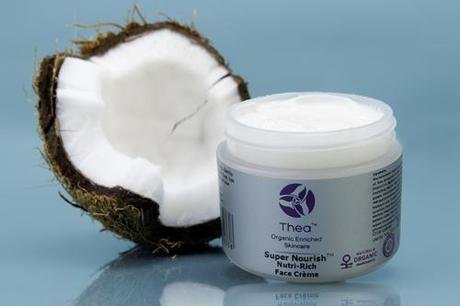
This guest post is by Althea Giscombe, Founder of Thea Skincare - a natural and organic skincare range for men, women and children.
You’ve probably heard of parabens because talk about them is a hot topic of discussion right now.
But why? What they are? What they do? Are they harmful?
Well, parabens are chemical preservatives which were discovered in the 1920s. They are good preservatives, which can prolong the shelf-life of cosmetic products – for more than five years.
You will potentially use products containing parabens on a daily basis.
Whether parabens are really harmful or not are being debated at the moment - and in particular whether there is a link between parabens and breast cancer.
The debate is likely to go on for years, but there are some studies which are indicating that they could be potentially harmful.
The use of parabens is widespread, mainly because they are cheap, easy to find and blend well in a wide range of cosmetic formulations in small amounts of generally much less than 1%. And, they are effective at stopping fungal and bacterial growth in cosmetic and skincare products.
You’ve probably seen their names on packaging and they are a mouthful—methylparaben, ethylparaben, propylparaben, butylparaben and isobutylparaben.
Despite there being lots of names for them, they all do pretty much the same thing and you’ll find when you look at the ingredients list on a label of a chemical cosmetic product that there is 1, 2 or even 3 of these parabens in one product.
You will find parabens in most things you use – in your shampoo, make-up, face creams, body creams and deodorants.
So, that is why questions are being asked whether there a direct link between breast cancer and parabens.
There is currently no conclusive evidence that parabens are harmful or that they can cause breast cancer. But, what we do know is that they have the ability to mimic estrogen and that they have been found in breast cancer tumours and can be isolated from other body tissues.
Think of it this way, estrogen is a female hormone that has been implicated in breast cancer and some breast cancer patients are on medication to actually block estrogen – so there could be a link.
So, how risky are parabens? Is there any proof?
We don’t know yet, but some researchers feel there may be reason for concern.
One of the most vocal is Philippa Darbre, a senior lecturer in oncology and researcher in biomolecular sciences at the University of Reading, in England.
Darbre specialises in the impact of estrogen on breast cancer and in 2004 her team published a pivotal study which detected parabens in 18 of 20 samples of tissue from breast tumour biopsies.
Her study didn’t prove parabens cause cancer, only that they were easily detected among cancerous cells. The study was criticised for not comparing paraben levels in normal tissue, but nevertheless, the results called out for more investigation.
Darbre makes an interesting link in the Journal of Applied Toxicology.
In her review of endocrine toxicity, absorption, esterase and human exposure, and discussion of potential human health risks, she said: “we’ve known for more than 25 years that estrogen exposure is linked to breast cancer development and progression; it is the reason tamoxifen [commonly prescribed to women with breast cancer] is used to disrupt estrogen receptors.
“So it is not such a leap to be concerned that repeated, cumulative, long-term exposure to chemicals that weakly mimic estrogen might be having an impact.”
I think the debate will go on for years to come as the presence of parabens in other body tissues (and healthy breast tissue) has not yet been studied.
But no one can unequivocally say that parabens only accumulate in breast tissue, nor can anyone say that parabens don’t only accumulate in breast tissue. No one can say with any certainty that parabens cause any kind of cancer, nor can anyone say with any certainty that parabens don’t cause any kind of cancer.
The controversy has fueled the interest in alternative natural cosmetic products, ones which are said to be paraben free. Natural cosmetic products which have natural preservative systems could be the answer to the issue.
There is now a new generation of cosmetics on the market with natural and/or organic ingredients that are totally paraben free and that have sophisticated preservative systems with shelf-lives that are long and still effective enough to meet the needs of an increasingly demanding cosmetic skincare market.
About the Author
Althea Giscombe, BSc (Hons), MSc, Founder of Thea Skincare
 Althea was born in Leeds and attended Nottingham Trent University at the age of 18, where she gained an honours degree in Combined Sciences and a year later was awarded a grant from the Science and Engineering Research Council to do a masters degree in Manufacturing and Polymer Technology at Loughborough University. Althea has worked in a number of corporate companies including Avon Cosmetics where she learnt about cosmetic skincare formulations and brand marketing.
Althea was born in Leeds and attended Nottingham Trent University at the age of 18, where she gained an honours degree in Combined Sciences and a year later was awarded a grant from the Science and Engineering Research Council to do a masters degree in Manufacturing and Polymer Technology at Loughborough University. Althea has worked in a number of corporate companies including Avon Cosmetics where she learnt about cosmetic skincare formulations and brand marketing.
In 2008, Althea went to Malawi in Africa for the first time which changed her life and perception of nature and Africa itself. It was there that Althea learnt about life that was simple, pure and natural. She lived in a mud hut within a traditional African village for a month and experienced life as a local Malawian, learning about living with nature and their way of life and how they used their natural environment to survive and to look after their skin.
Althea enjoyed the natural environment and one of her African experiences was when see was sitting by the lake one day just thinking how breathtaking it was and how lucky she was to be there, when all the women from the village arrived at the lake and began to take off their clothes. They then started to rub sand all over their bodies. Unsure of what was happening, Althea soon realised that they were using sand to exfoliate and condition their bodies. These experiences were the inspiration for her natural and organic skincare range,Thea Skincare http://www.theaskincare.com/.

